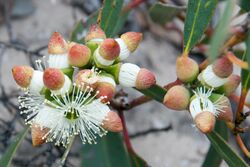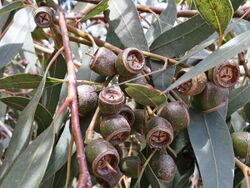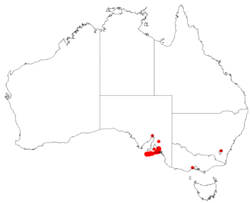Biology:Eucalyptus cosmophylla
| Cup gum | |
|---|---|

| |
| Eucalyptus cosmophylla, Kangaroo Island, SA | |

| |
| Eucalyptus cosmophylla, Cranbourne Botanic Gardens, VIC | |
| Scientific classification | |
| Kingdom: | Plantae |
| Clade: | Tracheophytes |
| Clade: | Angiosperms |
| Clade: | Eudicots |
| Clade: | Rosids |
| Order: | Myrtales |
| Family: | Myrtaceae |
| Genus: | Eucalyptus |
| Species: | E. cosmophylla
|
| Binomial name | |
| Eucalyptus cosmophylla F.Muell.[2]
| |

| |
| Collections data from AVH | |
| Synonyms[2] | |
|
Eucalyptus cosmophylla F.Muell. f. cosmophylla | |
Eucalyptus cosmophylla, commonly known as cup gum,[3] bog gum or scrub gum,[4] is a species of small tree or mallee that is endemic to South Australia. It usually has smooth bark and lance-shaped adult leaves, flower buds arranged in groups of three, white flowers and cup-shaped, cylindrical or hemispherical fruit.
Description
Eucalyptus cosmophylla is generally a multi-stemmed mallee growing to a height of 2–5 m (6 ft 7 in–16 ft 5 in), but sometimes a single-stemmed to 10 m (33 ft) with smooth, pale grey bark with white/pink areas and is sheds in plates. Young plants and coppice regrowth have stems that are more or less square in cross-section and juvenile leaves that have a petiole. They are elliptic at first, later egg-shaped, 40–90 mm (1.6–3.5 in) long and 45–95 mm (1.8–3.7 in) wide. Adult leaves are thick, the same dull grey-green on both sides, 80–180 mm (3.1–7.1 in) long and 13–50 mm (0.51–1.97 in) wide on a petiole 10–40 mm (0.39–1.57 in) long. The flower buds are arranged in groups of three on an unbranched peduncle 1–3 mm (0.039–0.118 in) long, the individual buds sessile or on a pedicel up to 6 mm (0.24 in) long. Mature buds are oval to pear-shaped, 11–22 mm (0.43–0.87 in) long and 7–15 mm (0.28–0.59 in) wide. They are green to yellow with a rounded or conical to beaked operculum usually shorter than the hypanthium. Flowering occurs between July and November and the flowers are white to cream-coloured with all anthers being fertile. The fruit is a woody, cup-shaped, cylindrical or hemispherical capsule, 9–18 mm (0.35–0.71 in) long and 10–22 mm (0.39–0.87 in) wide. The fruit generally has two ribs, a thick rim and broad valves with the tips usually just below the rim. The brown seeds are polyhedral and have narrow wings along the main edges.[3][4][5][6][7][8]
Taxonomy and naming
Eucalyptus cosmophylla was first formally described in 1855 by Ferdinand von Mueller from specimens collected "on stony places in the Lofty and Bugle Ranges" and the description was published in Transactions and Proceedings of the Victorian Institute for the Advancement of Science.[9][10] The specific epithet (cosmophylla) is derived from the Ancient Greek words kosmos meaning "ornament", "decoration" or "dress"[11]:578 and phyllon meaning "leaf".[11]:466[7]
Distribution and habitat
Cup gum grows near the sea in open shrubland, open forest and heath, usually in soils of low fertility. It is found in the southern Lofty Ranges, Fleurieu Peninsula and on Kangaroo Island.[3][6]
See also
References
- ↑ Fensham, R.; Laffineur, B.; Collingwood, T. (2019). "Eucalyptus cosmophylla". IUCN Red List of Threatened Species 2019: e.T133375128A133375130. doi:10.2305/IUCN.UK.2019-3.RLTS.T133375128A133375130.en. https://www.iucnredlist.org/species/133375128/133375130. Retrieved 28 September 2021.
- ↑ Jump up to: 2.0 2.1 "Eucalyptus cosmophylla". Australian Plant Census. https://biodiversity.org.au/nsl/services/apc-format/display/114290.
- ↑ Jump up to: 3.0 3.1 3.2 "Eucalyptus cosmophylla (Myrtaceae): Cup Gum". South Australian Seed Conservation Centre. https://spapps.environment.sa.gov.au/SeedsOfSA/speciesinformation.html?rid=1808.
- ↑ Jump up to: 4.0 4.1 Black, John McConnell (1926). Flora of South Australia (Part III). Adelaide: Government Printer. p. 419. https://data.environment.sa.gov.au/Content/Publications/Flora%20of%20SA%201st%20edition%20part%20III%20WEB.pdf. Retrieved 16 May 2019.
- ↑ "Eucalyptus cosmophylla". Euclid: Centre for Australian National Biodiversity Research. https://apps.lucidcentral.org/euclid/text/entities/eucalyptus_cosmophylla.htm.
- ↑ Jump up to: 6.0 6.1 Chippendale, George M.. "Eucalyptus cosmophylla". Australian Biological Resources Study, Department of the Environment and Energy, Canberra. https://profiles.ala.org.au/opus/foa/profile/Eucalyptus%20cosmophylla.
- ↑ Jump up to: 7.0 7.1 Nicolle, Dean (2013). Native eucalypts of South Australia. Adelaide: Dean Nicolle. pp. 38–39. ISBN 9780646904108.
- ↑ "Eucalyptus cosmophylla". State Herbarium of South Australia. http://www.flora.sa.gov.au/cgi-bin/speciesfacts_display.cgi?form=speciesfacts&name=Eucalyptus_cosmophylla.
- ↑ "Eucalyptus cosmophylla". APNI. https://id.biodiversity.org.au/instance/apni/456076.
- ↑ von Mueller, Ferdinand (1855). "Description of fifty new Australian plants, chiefly from the colony of Victoria". Transactions and Proceedings of the Victorian Institute for the Advancement of Science 1: 32–33. https://www.biodiversitylibrary.org/page/43692597#page/46/mode/1up. Retrieved 16 May 2019.
- ↑ Jump up to: 11.0 11.1 Brown, Roland Wilbur (1956). The Composition of Scientific Words. Washington, D.C.: Smithsonian Institution Press.
Further reading
| Wikimedia Commons has media related to Eucalyptus cosmophylla. |
- Seberg, O. (1986) New Information on Ferdinand J. H. Mueller's Early Taxonomic Papers (1854-1856). Taxon 35, 262-271.JSTOR
Wikidata ☰ Q15397856 entry
 |


